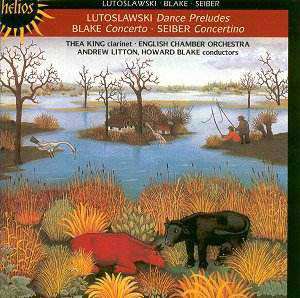Lutoslawski’s Dance Preludes for clarinet
and piano were composed in 1954 and the orchestral version for small
orchestra recorded here was made by the composer in 1955. This well-known
and popular piece is a typical product of Lutoslawski’s attitude during
the painful Stalinist years in Poland. He chose to compose folk-inspired
music rather than comply with the Socialist Realism’s dictates. The
peak of his output of that period is the magnificent Concerto
for Orchestra of 1954. In any version, Dance Preludes
is a delightful, folksy piece that has since become highly popular,
and quite deservedly so.
The music of Seiber is still too little-known nowadays
although some of his late major works were recorded by Decca many years
ago during the LP era (some of these recordings have been re-issued
on Continuum). The Concertino for Clarinet and String Orchestra
is the only one so far that has been recorded more than once. (Another
recording was issued by RCA in 1977.) Originally written as a clarinet
quintet in 1928, it was arranged for string orchestra in 1951. It is
also a folk-inspired piece that brings Kodaly or Lajtha rather than
Bartók to mind. It is a hugely enjoyable piece, and it is good
to have this fine performance available again.
Howard Blake is a versatile composer who may be better
known for his marvellous film scores The Snowman and Granpa
in which his gifts for colourful orchestration and memorable tunes are
clearly evident. He nevertheless also composed a good deal of concert
works including the superb choral-orchestral Benedictus
and several concertos. Though the intent is overtly more serious, the
music of the Clarinet Concerto of 1984 is still memorably
tuneful, superbly scored and quite attractive. The Clarinet Concerto
is in every respect a fine work that deserves wider currency, and Thea
King’s advocacy should earn this fine piece many new friends, hopefully
among clarinettists.
An attractive programme, superbly performed and recorded.
If you did not get it when it was first released, you now have no reason
to ignore it, especially at the customer-friendly bargain price of the
Helios re-issues.
Hubert Culot


![]() See
what else is on offer
See
what else is on offer 